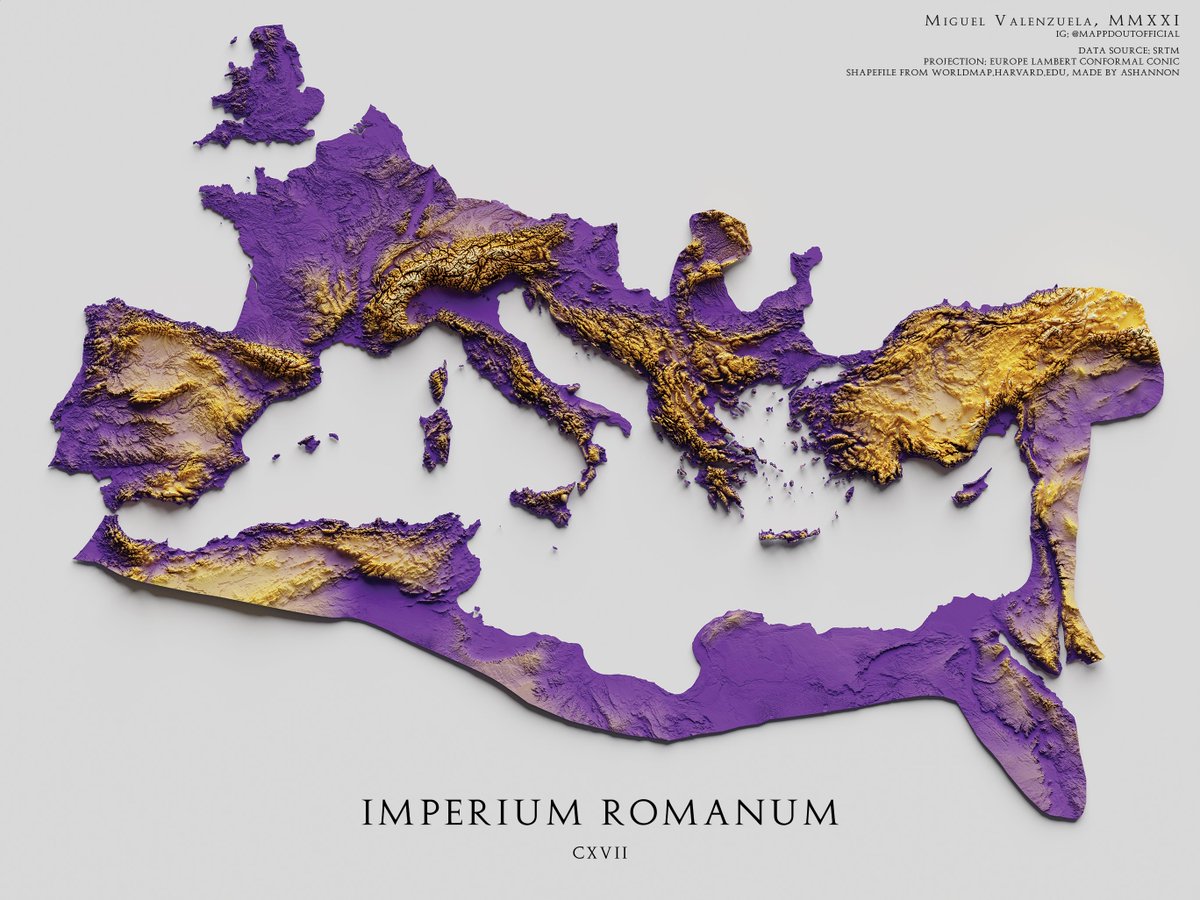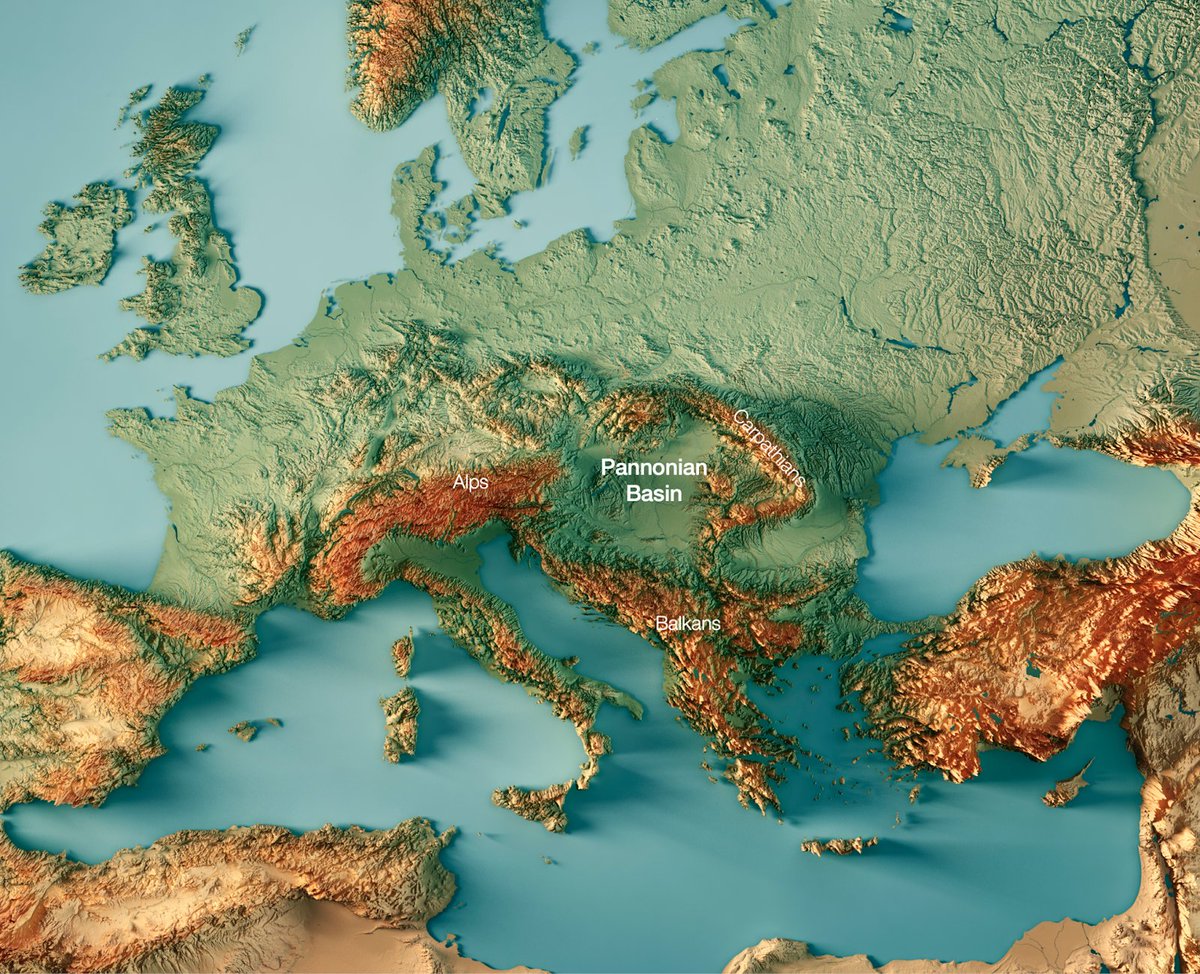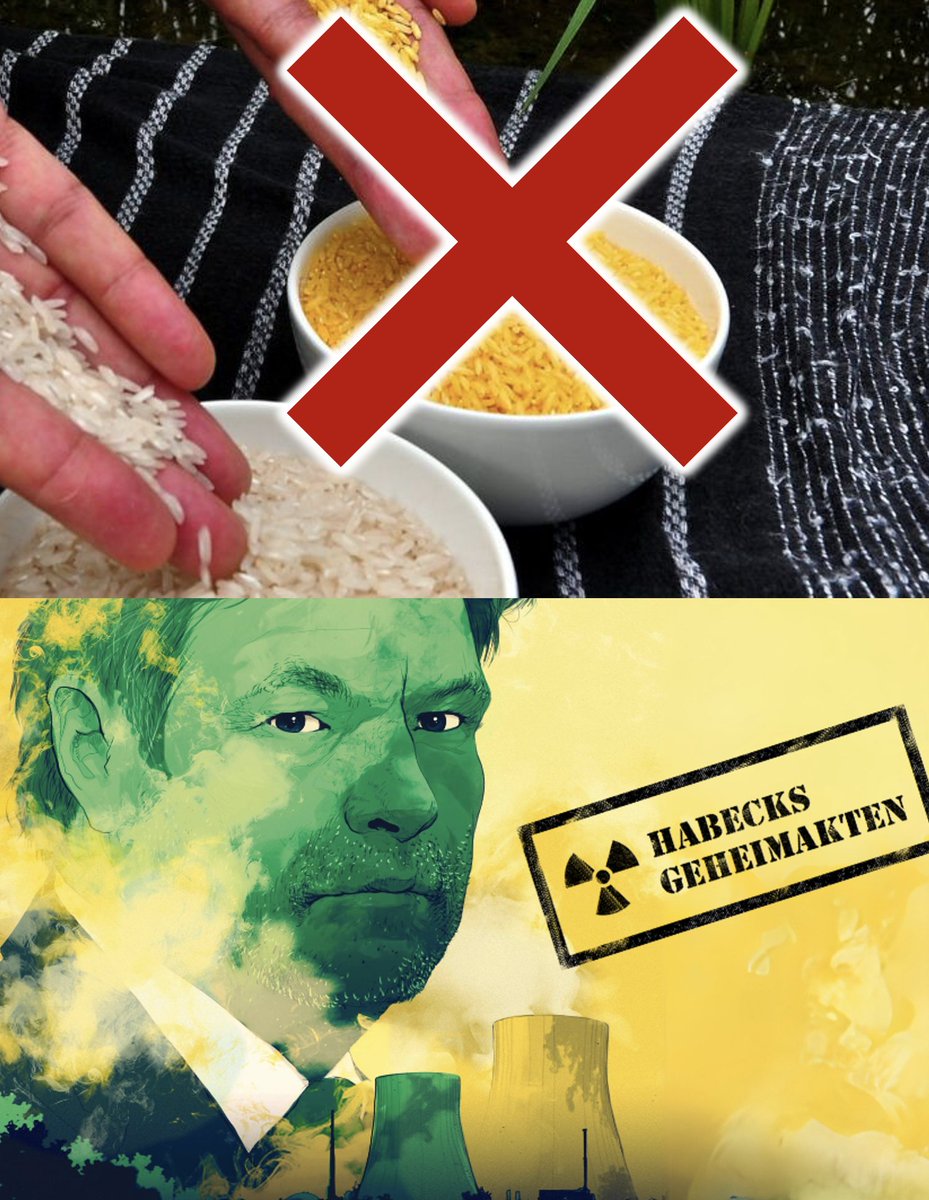What makes Budapest unique?
It wasn't just 2 cities (Buda + Pest) but 3-4!
Why?
And why is it where it is?
Why did it become the capital of Hungary?
It's no coincidence, and it explains the history of the country
Look at this:
Thread 🧵
It wasn't just 2 cities (Buda + Pest) but 3-4!
Why?
And why is it where it is?
Why did it become the capital of Hungary?
It's no coincidence, and it explains the history of the country
Look at this:
Thread 🧵
The Pannonian Basin, this huge plain surrounded by mountains, was going to have a capital. But where would it be? 

It would probably be on the main artery: the Danube, which splits the plain in half
1. Navigable all the way to Germany—fantastic for trade
2. Drinking water, great for living
3. Water for irrigation ➡️ crops
But early on the Danube had another huge advantage:
1. Navigable all the way to Germany—fantastic for trade
2. Drinking water, great for living
3. Water for irrigation ➡️ crops
But early on the Danube had another huge advantage:

Let's zoom in: It was the Danube!
It was large enough that it was a perfect border, very hard to pass, so easy to defend
Romans built many cities on the Danube
The capital of the region would eventually be on that river. But where exactly?
It was large enough that it was a perfect border, very hard to pass, so easy to defend
Romans built many cities on the Danube
The capital of the region would eventually be on that river. But where exactly?

The entire basin seems flat... but it's not
Left: topography of the Pannonian Basin (red=mountains)
Right: Highlighting the topography of the plain
Notice that mountain range that penetrates the basin?


Left: topography of the Pannonian Basin (red=mountains)
Right: Highlighting the topography of the plain
Notice that mountain range that penetrates the basin?


If we zoom in, we see this well: Budapest is on the Danube, but also close to that mountain range. Why is this useful? 

Because the elevation creates a ford, which makes the river more easily crossable (see yellowish on the image)
This is probably one of the reasons why the Romans built a city there—on an ancient trading path
This is probably one of the reasons why the Romans built a city there—on an ancient trading path

This is what the Roman city looked like, compared to the Budapest area called Óbuda today (for Old Buda).
That pass was very important, because controlling it meant controlling both the west side of the Danube, the border, and the trade in the area
That pass was very important, because controlling it meant controlling both the west side of the Danube, the border, and the trade in the area

That's why the Romans built not one, not two, but three forts there!
• Aquincum was in the main city
• Transaquincum was on the other side of the Danube, to control all passage
• Contra Aquincum was where Pest is today
• Aquincum was in the main city
• Transaquincum was on the other side of the Danube, to control all passage
• Contra Aquincum was where Pest is today

Notice by the way how all these cities are called after Aqua—latin for water. That's because Budapest is not only bathed by the Danube, but also by springs coming from the mountains nearby, and the dozens of hot springs in the region. Here's a mosaic of a Roman bath in Obuda 

Today Budapest has the most hot springs and hot baths of any capital in the world
The Romans appreciated that, and so they built Aquincum (which became a capital of the Pannonia Region) because of:
• Danue
• Ford
• Trade
• Hot springs
The Romans appreciated that, and so they built Aquincum (which became a capital of the Pannonia Region) because of:
• Danue
• Ford
• Trade
• Hot springs

But Buda & Pest are not where Aquincum or Transaquincum were. Why?
The Mongols
Horse-ridden, they were able to pass the mountains that protect the Pannonian basin
They destroyed the east
When winter came, it froze the Danube. They crossed it & destroyed the rest of the basin
The Mongols
Horse-ridden, they were able to pass the mountains that protect the Pannonian basin
They destroyed the east
When winter came, it froze the Danube. They crossed it & destroyed the rest of the basin

The rulers decided it was not enough to have the protection of the Danube. They also needed the protection of a hill. So they moved the government south, to the Buda Hill
For some time, the government was split between Visegrád and Buda. You can imagine why by looking at a picture of the Visegrád castle: 

Visegrád was easily defensible because of the mountains, but it had a big drawback: the mountains made trade very hard. It was far away from the commercial center.
What was the commercial center of the area?
Pest
Why?
What was the commercial center of the area?
Pest
Why?

Pest had already hosted Contra-Aquincum centuries earlier. What's special about it?
It's close to this ford we were discussing, but also something else:
• It's flat
• It used to be protected by an arm of the Danube! Here's a picture:
It's close to this ford we were discussing, but also something else:
• It's flat
• It used to be protected by an arm of the Danube! Here's a picture:

You can "see" that arm to this day, if you zoom in on the topography of the area. Look at the light blue area around Contra Aquincum with white lines and arrows (the colors mean it's at a lower level than the rest of the ground) 

Over the centuries, Buda and Pest co-evolved and grew into the administrative & trading capital:
1. The region was great because:
• Danube ➡️ Trade
• Center of the Pannonian Basin ➡️ control
• On a traditional trade route, probably because of its ford
1. The region was great because:
• Danube ➡️ Trade
• Center of the Pannonian Basin ➡️ control
• On a traditional trade route, probably because of its ford
Buda and Pest are both in that region, clode to each other, but also:
2. Buda was defensible:
• On the west side of the Danube, good against attackers from the east
• On a hill
3. Pest was
• Flatter, so easier access to river trade
• Yet protected by an arm of the Danube
2. Buda was defensible:
• On the west side of the Danube, good against attackers from the east
• On a hill
3. Pest was
• Flatter, so easier access to river trade
• Yet protected by an arm of the Danube
Over the centuries, Buda and Pest co-evolved:
• Buda became the administrative center, richer and calmer
• Pest became the trading center, bustling with life
They have conserved these characters to this day
Despite being connected by a permanent bridge in the 19th C
• Buda became the administrative center, richer and calmer
• Pest became the trading center, bustling with life
They have conserved these characters to this day
Despite being connected by a permanent bridge in the 19th C

And that's why Budapest is the capital
I hope you enjoyed this! Follow me for more threads like this
Much more detail about Budapest in this (premium) article
I also have a free newsletter. Subscribe to receive 1 article/week!
unchartedterritories.tomaspueyo.com/p/budapest
unchartedterritories.tomaspueyo.com/subscribe
I hope you enjoyed this! Follow me for more threads like this
Much more detail about Budapest in this (premium) article
I also have a free newsletter. Subscribe to receive 1 article/week!
unchartedterritories.tomaspueyo.com/p/budapest
unchartedterritories.tomaspueyo.com/subscribe
• • •
Missing some Tweet in this thread? You can try to
force a refresh


















